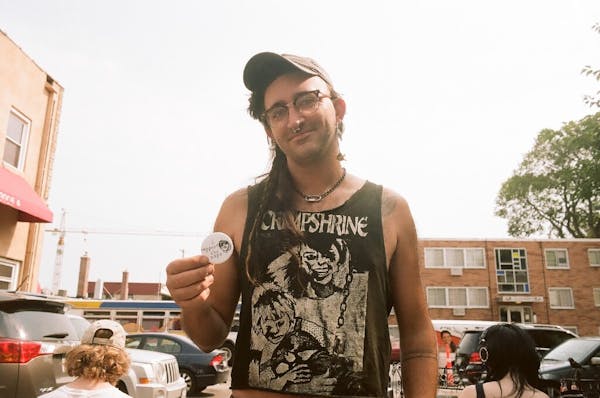The man who might be the best-looking quarterback in the National Football League strolled up the wide steps of the State Capitol Monday, followed by a zoo-full of the craziest political activists ever to gather at the people's building.
The guy with the dimpled chin, Christian Ponder, was wearing a crisp black shirt and charcoal slacks. His hair was trimmed short and he wore a couple of those rubber bracelets that suggest you care about things.
Atop the stairs were photographers. Halfway up, a fan stood with a baby. Ponder looked at the man and said, "Can I hold him?"
I guess the scouts were right: Ponder can read the coverage and he's got poise under pressure.
Photographers scrambled and a fidgety handler yelled, "Can we get some Vikings fans behind him?"
And there you have it, a completely transparent and organic telling moment in the union of sports and politics, just like the action inside.
Eh-hem.
I like football and watch it most weekends. But if the Vikings moved, I would simply find something else to do for three hours on Sunday, most likely another taxpayer-supported activity. So I watch football the way I watch politics, not so much because I'm fervent about the outcome, I'm just interested in the story lines.
Those happened inside the Capitol the past two days, where legislators argued over the real issues before them. Not for economic vitality or some sort of group hug that football supposedly gives us. They argued for self-preservation, political agendas and, of course, for a little taste of the sugar.
Monday, amendments flooded into the speaker's podium like pleas from dying men. Tuesday was even worse, with more than 100.
Rep. Karen Clark, DFL-Minneapolis, for example, saw the open purse as a chance to grab some money for the poor, requesting $400 million in bonding to fix up public housing "creating the same number of [construction] jobs as the stadium, coincidentally."
Or not coincidentally.
Rep. Morrie Lanning R-Moorhead, sponsor of the stadium bill, called Clark's amendment "not germane" and "another attempt to spend money we don't have."
I swear, he did this with a straight face.
Rep. Tom Rukavina, DFL-Virginia, got all kinds of folksy, crafting a rambling soliloquy that included a quote from the Grateful Dead: "What a long, strange trip it's been."
Strange? You know it's strange when perhaps the best line Monday night came from Rep. Mary Franson, R-Alexandria, known for the occasional gaffe. She said that with gambling as a source of funding, the structure "becomes the stadium that losers built."
Nice.
Rukavina's amendment proposed that everything going into the stadium, from steel and granite to Toro mowers to hot dogs and nacho cheese, be 25 percent Minnesota made. Irrational? Dizzyingly unworkable?
Yep, it passed.
At some point Monday, Thomas Huntley, DFL-Duluth, got up and said with candor: "People are watching, and see how stupid we look."
You could almost see them, on the far left (money for billionaires!) and far right (fiscal responsibility!), triangulating whether failing to vote their conscience was worse for them politically than being blamed for the Vikings leaving. (Visual aid: holding one hand palm up, "conscience?" then the other, "votes?")
There were moments of clarity. Rep. Pat Garofalo, R-Farmington, proposed that some of the money from stadium naming rights actually go to the people who funded it -- taxpayers -- a notion so obviously fair most predicted it would be quickly negotiated away. And Sen. Julie Rosen, R-Fairmont, who wanted user fees.
By Tuesday evening, it appeared the Vikes and their fans would get their stadium, and everyone from downtown businesses to unions and hog butchers will get a little somethin' and in the end we'll all pay for it, through the nose.
As the Monday rally ended in the rotunda, a tourist group from China entered the building, looking bewildered as they snapped photos of people in face paint as they screamed "Build it!"
I asked one of them what he thought of American politics in action.
"Impressive!" he said. "But not like my country."
No, the Politburo it wasn't.
The group moved to the governor's office, where a guide explained: "It's so wonderful that you can get this close to the governor's office," she said. "It's right through here."
Then the group moved into the foyer of the office where all the important people meet to make the important decisions.
It was impressive and wonderful, indeed, that they could get so close to power.
And they weren't even lobbyists.
jtevlin@startribune.com • 612-673-1702

Tevlin: 'Against all odds, I survived a career in journalism'

Tevlin: Grateful Frogtown couple fight their way back from fire and illness




